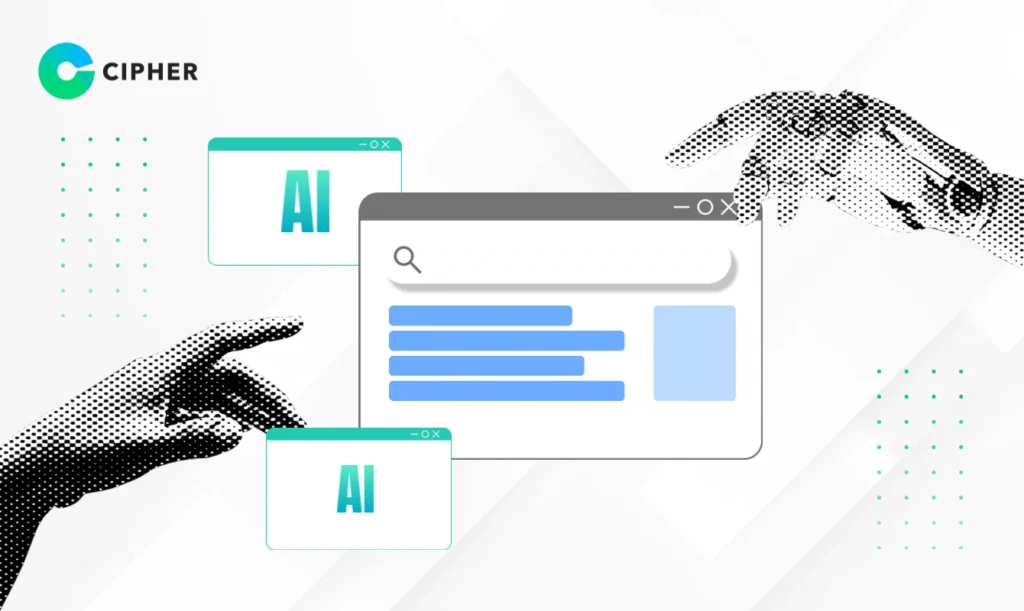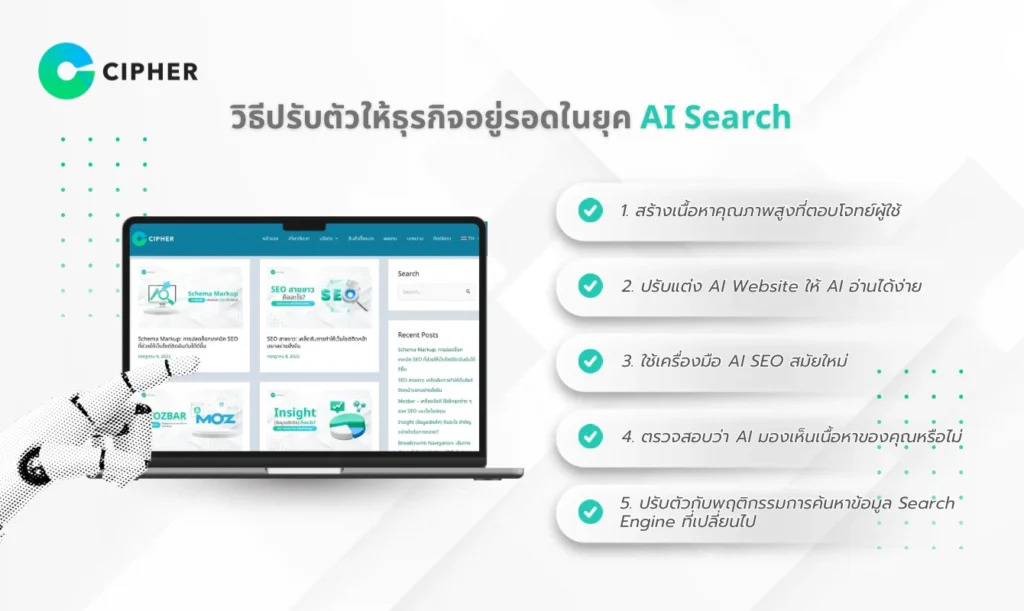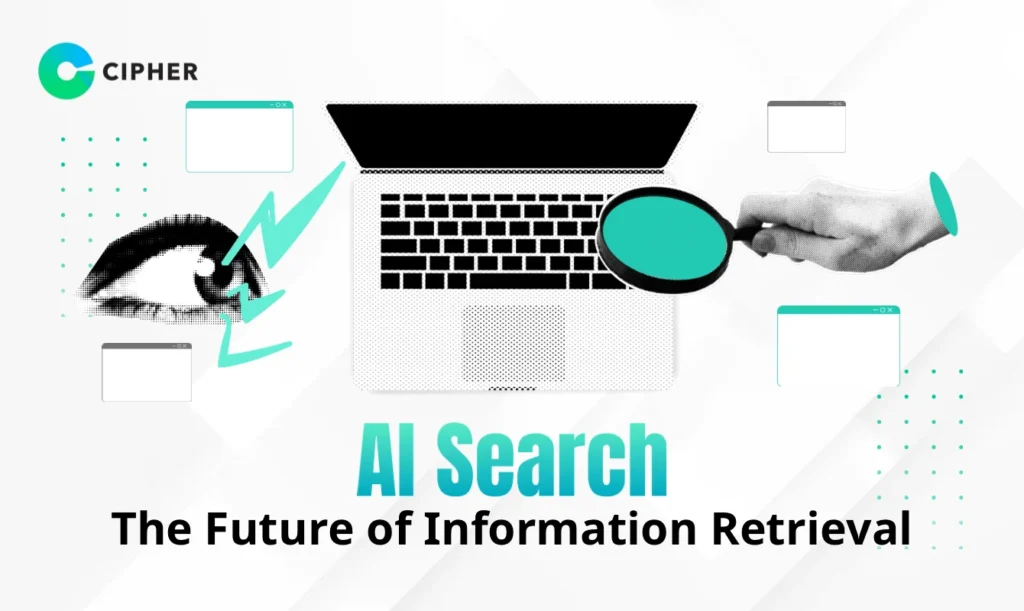Internet searching is transforming dramatically! The familiar process of typing keywords into Google and clicking on websites is being replaced by AI search technology that instantly answers questions without requiring users to visit websites. If your business doesn’t adapt to these new search engines, this could be a dangerous signal that might cause customers to easily overlook your business.
This article will explore every aspect of AI search engines, from their definition and mechanisms to strategies for helping your business survive in this era of AI SEO tools that are permanently changing the world of information retrieval and search engine rankings.
Table of Contents
What is AI Search? Why Should We Care?

AI search is an information retrieval system that uses Artificial Intelligence to process, analyze, and deeply understand data, extending beyond the simple keyword-website matching of traditional search engines.
The highlight of an AI search engine is its ability to accurately interpret context, meaning, and relationships between information, making searching on Google or other alternative search engines easier and more natural. It’s like talking to an expert who truly understands what you’re looking for on the AI web.
Google itself has increasingly integrated AI into its platform to maintain its position as the best search engine, particularly with new features like “AI Overviews” launched in 2024 and “Google AI Mode” in 2025, responding to changing user behaviors. For a deeper understanding of how AI is reshaping search technology, check out Moveworks’ AI search guide.
How Does AI Search Work?
1. Natural Language Processing (NLP)
Have you ever noticed how the best search engine understands what you mean even when you misspell words? That’s the power of NLP, which helps AI search better understand human language, whether it’s questions, misspelled words, or everyday speech.
NLP makes searching on search engines easy. We can type complete sentences instead of just short keywords, such as “coffee shops open now near me with parking and free wifi” instead of “coffee shop open nearby parking wifi.”
2. Machine Learning (ML) and Deep Learning (DL)
Imagine AI web technology having a brain that constantly learns from our search behaviors. When we click on results, spend time on them, or search again, AI remembers and progressively refines results to better match our preferences.
ML and DL enable AI search engines to learn complex data patterns and connect unclear relationships between information, making results more accurate and relevant to users, which ultimately improves search engine rankings.
3. Semantic Search
This is the special ability that allows AI search to understand “meaning,” not just “words.” For example, when we search for “good Japanese restaurants,” AI understands we’re looking for quality Japanese dining establishments, not just pages containing the words “good,” “Japanese,” and “restaurants.”
Semantic Search also helps alternative search engines understand relationships between words, such as connections between “car” and “sedan” or “smartphone” and “mobile phone,” making searches more comprehensive.
4. Visual & Voice Search
Beyond typing, modern search engines also support image and voice searches, making the search experience more convenient and natural. These features are increasingly becoming standard in any AI search engine that aims to be the best search engine for users.
Imagine seeing a beautiful pair of shoes on the street. Instead of having to ask where they were purchased, you can simply take a photo and let AI search find it for you, instantly discovering the model, price, and where to buy them.
How is AI Search Different from Traditional SEO?
In the past, we used traditional SEO techniques to improve search engine rankings, focusing on:
- Using relevant keywords in content
- Building backlinks from other websites
- Optimizing website structure for accessibility
But in the AI search engine era, these techniques may no longer be sufficient because AI processes information differently, leading to new concepts like AI SEO tools that adapt to AI web operations. If you’re new to SEO concepts, our beginner’s SEO guide explains the fundamentals you’ll need to understand these changes. The main concepts include:
1. AEO (Answer Engine Optimization)
2. GEO (Generative Engine Optimization)
Notable AI Search Engines You Should Know
Several alternative search engines are currently changing how we search for information:
- Google AI Search – AI integration in Google search with new features like Google AI Overviews and Google AI Mode
- Bing AI – A search tool using AI to improve search accuracy with Visual Search features that make image searching easier
- Perplexity AI – An AI search engine that searches information in real-time and displays reliable references
- ChatGPT Search – A question-answering system using AI search to find information and answer questions naturally
- You.com – An AI web platform focusing on privacy that can customize search results to personal needs
What are AI Overviews? Google's New Feature Worth Watching
AI Overviews is a new Google search engine feature available since October 2024. This feature summarizes information from multiple websites into one comprehensive, easy-to-understand answer, significantly impacting search engine rankings.
AI Overviews appears above normal search results, especially when search terms are complex questions or require in-depth information. Besides summarizing data, it also includes links to sources where users can read more information on the AI web.
Currently, AI Overviews appears in approximately 7-15% of all Google searches, typically displaying with:
- Long-Tail searches with 4+ words
- Searches with low Search Volume
- Searches with Informational Intent (99.2%)
- Only 10% of Commercial searches display AI Overviews
Impact of AI Search on Businesses
The arrival of AI search engines affects businesses in several ways, which could cause your business to easily disappear from customer view if you don’t adapt:
- Decreased click rates – When AI search can answer questions directly, users may no longer need to click on websites
- Increased competition – Businesses must compete to create higher quality and more credible content to maintain search engine rankings
- Content strategy shifts required – From focusing on keywords to answering questions and providing comprehensive information
- Focus on end results rather than clicks – Although clicks may decrease, the quality of clicks increases, so focus should be on business goals rather than just traffic numbers
How to Adapt Your Business to Survive in the AI Search Era

1. Create High-Quality Content That Meets User Needs
Quality content is the key to being selected by AI search for display in results. You should create content that:
- Matches Search Intent or user needs
- Covers important points comprehensively
- Is designed for easy reading, using sub-headings and bullet points
- Is original content, not copied from elsewhere
- Follows E-E-A-T principles to demonstrate expertise and credibility
2. Optimize Your AI Website for Easy AI Reading
Make your website friendly to AI search engines with these methods:
- Increase website speed – AI search takes only 1-5 seconds to extract data; slow-loading sites may be overlooked
- Use clean, clear HTML – Use semantic tags like
<article>,<section>,<nav>to help AI understand content structure - Use Metadata and Schema Markup – Helps AI web systems better understand content context
- Display publication and update dates – Search engines often prioritize up-to-date information
- Allow AI Crawler access – Check robots.txt file to ensure it doesn’t block important AI Crawlers
3. Use Modern AI SEO Tools
Increase chances of your content being displayed by the best search engine platforms with these techniques:
- Write Heading Tags as questions – Such as “What is AI Search?” or “How can businesses survive in the AI era?”
- Use appropriate Schema Markup – Such as Article Schema, FAQ Schema, Product Schema
- Create content in question-answer format – Helps AI search engines understand which parts are questions and which are answers
- Use Structured Data – Helps tell AI what each content section is, such as product name, price, reviews
Adapting to the AI search era requires appropriate tools. Tools like Yoast SEO and Ahrefs can effectively help analyze and improve websites for AI compatibility and boost search engine rankings.
.4. Check Whether AI Can See Your Content
คุณสามารถตรวจสอบได้ว่า AI สามารถเข้าถึงและเข้าใจเนื้อหาของคุณหรือไม่ ด้วยวิธีต่อไปนี้:
- You can verify whether AI search can access and understand your content with these methods:
- Use Andi Search (AndiSearch.com) by pasting your website URL; if Summarize or Explain options appear, AI web systems can access your content
- Use Firecrawl to check if AI Agent can read your content
- Check Google Search Console for access problem notifications
5. Adapt to Changing Search Behaviors
User search behavior is shifting from using keywords to more natural conversation across all search engines. You should:
- Support voice and image searches
- Understand that users often ask more complex questions on AI search engines
- Update business information in Google Business Profile comprehensively and keep it current
- Create good user experiences regardless of access channel
CIPHER Services to Help Your Business Prepare for AI Search
As a full-service Digital Marketing agency, CIPHER offers services to help keep your business visible to customers in the AI search engine era:
1. Analyze Your AI Website Readiness
2. Restructure Your Website to be AI-Friendly
3. Create Content That Meets AI Search Requirements
4. Comprehensive AI SEO Tool Solutions
We combine both traditional SEO and new techniques to create strategies covering both ranking in traditional search engines and being selected by alternative search engines powered by AI. Learn more about our specialized SEO services for optimizing your digital presence.





